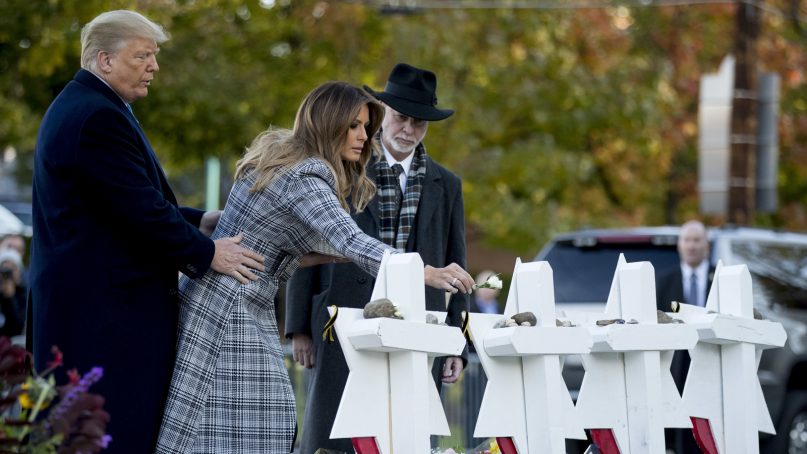PITTSBURGH (AP) — One stone and one white rosebud for each victim.
President Trump and first lady Melania Trump paid homage Tuesday (Oct. 30) to each of the 11 people slain in the worst instance of anti-Semitic violence in American history. As the Trumps placed their tributes outside the Tree of Life synagogue, protesters nearby shouted that the president was not welcome.
The emotional, dissonant scene reflected the increasingly divided nation that Trump leads, one gripped by a week of political violence and hate and hurtling toward contentious midterm elections that could alter the path of a presidency.
On their arrival in Pittsburgh, the Trumps entered the vestibule of the synagogue, where they lit candles for each victim before stepping outside. Shouts of “Words matter!” and “Trump, go home!” could be heard from demonstrators gathered not far from where a gunman had opened fire on Saturday.
Rabbi Jeffrey Myers, who had been conducting services when the shots rang out, gestured at the white Star of David posted for each victim. At each, the president placed a stone, a Jewish burial tradition, while the first lady added a flower. They were trailed by the president’s daughter Ivanka Trump and her husband, Jared Kushner, who are Jewish.
Near the synagogue, flowers, candles and chalk drawings filled the corner, including a small rock painted with the number “6,000,011,” adding the victims this week to the estimated number of Jews killed in the Holocaust.
The Trumps later spent more than an hour at the University of Pittsburgh Medical Center, where some of the victims are recovering. The couple’s motorcade passed several hundred protesters on the street and a sign that said “It’s your fault.” Inside, Trump visited with wounded police officers and spent an hour with the widow of victim Dr. Richard Gottfried, according to White House press secretary Sarah Huckabee Sanders.
Trump stepped into the role of national consoler, a title he wears uncomfortably, with his visit to the Squirrel Hill neighborhood. More at home waging partisan warfare than assuaging America’s grief, Trump has shied away from public displays of unity in the wake of other tragedies.
Sanders said Trump did not speak publicly Tuesday to denounce anti-Semitism because he has spoken about it before.
“He wanted today to be about showing respect for the families and the friends of the victims as well as for Jewish Americans,” Sanders said.
Questions have long swirled about the president’s credibility as a unifier. Since his 2016 Republican campaign for the White House, Trump has at times been slow to denounce white nationalists, neo-Nazis and other hate-filled individuals and groups that found common cause with his nationalistic political rhetoric.
Trump traveled to the historic hub of the city’s Jewish community as the first funerals were held for the victims, who range in age from 54 to 97. The dead include a set of brothers, a husband and wife, professors, dentists and a physician.
Hundreds of protesters assembled to show their displeasure with Trump’s presence, some carrying signs that said “Hate has No Home in Squirrel Hill” and “Trump Loves Nazis.”
Squirrel Hill resident Paul Carberry said Trump should not have visited until the dead were buried.
“He didn’t pull the trigger, but his verbiage and actions don’t help,” Carberry said.
But Shayna Marcus, a nurse who rushed to the synagogue on Saturday to help with the wounded, said she felt that the president was taking an unfair portion of the blame.
“I don’t think focusing on Trump is the answer — or on politics,” said Marcus, whose four yarmulke-wearing boys carried signs in support of the president.
White House counselor Kellyanne Conway, back in Washington, told reporters: “If people are there to protest, that’s their right. For the president, it was not a moment for politics.”
When Air Force One touched down at the airport outside Pittsburgh, the Trumps were not greeted by the usual phalanx of local officials that typically welcomes a visiting president, a reflection of controversy surrounding the visit.
Pittsburgh Mayor Bill Peduto, a Democrat, told reporters before the visit was announced that the White House ought to consult with the families of the victims about their preferences and asked that the president not come during a funeral. Neither he nor Democratic Gov. Tom Wolf appeared with Trump.
Beth Melena, campaign spokeswoman for Wolf, said the governor based his decision to stay away on input from the victims’ families, who told him they did not want the president to be there on the day their loved ones were being buried.
As Trump’s motorcade wound through downtown Pittsburgh, some onlookers saluted the president with upraised middle fingers and others with downturned thumbs.
The White House had invited the top four congressional leaders to join Trump in Pennsylvania, but none accompanied him.
A spokesman for Republican Senate Majority Leader Mitch McConnell said he already had events in his home state of Kentucky, pushing back on the suggestion that he declined. Republican House Speaker Paul Ryan’s office said he could not attend on short notice. Democratic Senate Minority Leader Chuck Schumer and Democratic House Minority Leader Nancy Pelosi also opted not to participate.
(Zeke Miller and Jonathan Lemire write for The Associated Press. Lemire reported from New York. Associated Press writers Allen G. Breed and Maryclaire Dale in Pittsburgh and Jill Colvin in Washington contributed to this report.)





